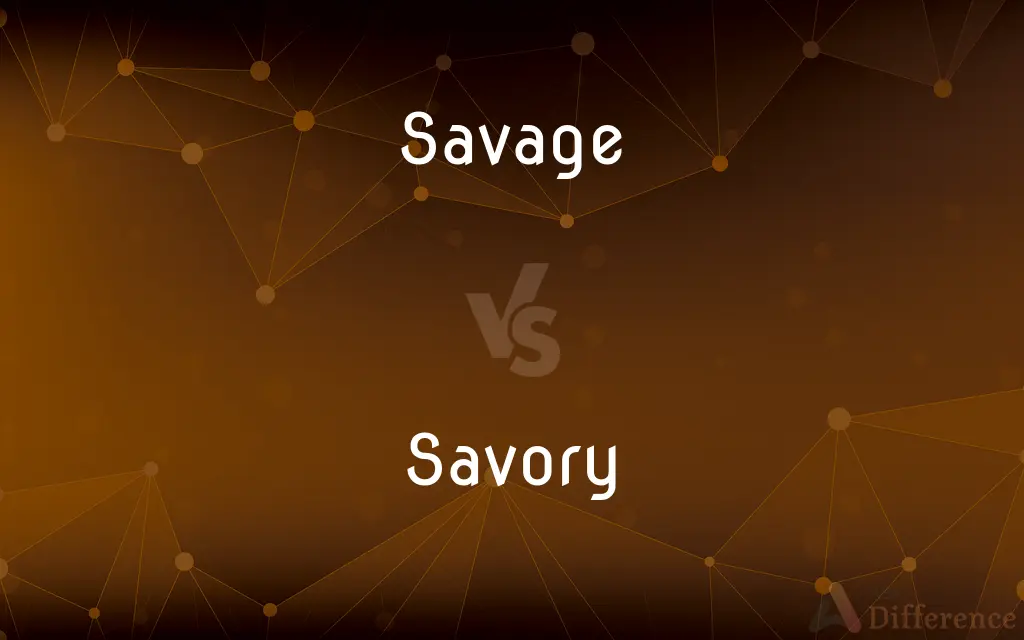Savage vs. Savory — What's the Difference?
By Tayyaba Rehman — Updated on October 12, 2023
Savage refers to something fierce, violent, or uncontrolled, while savory denotes a pleasant, salty or spicy flavor, not sweet.

Difference Between Savage and Savory
Table of Contents
ADVERTISEMENT
Key Differences
"Savage" and "Savory" are distinct terms, each possessing a unique etymology and application. While "savage" typically describes something or someone that is fierce, wild, or uncontrolled, "savory" refers to a specific taste profile — one that is pleasantly salty or spicy, contrasting sweet flavors.
Historically, the term "savage" has roots suggesting "wild" or "untamed" elements, be it landscapes, animals, or even human behaviors. When one mentions a "savage beast," it evokes images of a creature that's fierce or possibly dangerous. On the other hand, "savory" emerges from culinary contexts. Picture a "savory dish" — it’s likely rich, full-flavored, perhaps infused with herbs or spices, but certainly not sweet.
The word "savage" can also possess cultural implications. Historically, it's been used, often pejoratively, to describe certain indigenous or tribal societies deemed "primitive" by colonizers. "Savory," beyond its culinary applications, doesn't have such socio-cultural connotations. Instead, it remains more straightforward, denoting specific taste profiles or, metaphorically, suggesting something morally wholesome.
In literature or daily language, "savage" can be employed metaphorically to describe harsh criticisms or brutal truths. A "savage remark" doesn't hold back. Comparatively, "savory" remains rooted in the sensory — either the literal taste or, figuratively, a situation or experience that is agreeable or enjoyable.
Comparison Chart
Definition
Fierce, wild, or uncontrolled.
Pleasantly flavored, not sweet.
ADVERTISEMENT
Etymology
Indicates wildness or fierceness.
Indicates a specific taste profile.
Cultural Implications
Has been used to describe "primitive" societies.
Lacks socio-cultural implications.
Usage in Literature
Can describe harsh criticisms.
Suggests something agreeable.
Sensory Connection
Evokes a sense of danger or brutality.
Directly related to taste.
Compare with Definitions
Savage
Primitive or uncivilized.
Historically, explorers deemed uncharted lands as savage territories.
Savory
Appetizing to the taste or smell.
The aroma of the savory dish filled the room.
Savage
Harsh or merciless.
Nature can be savage, testing the limits of survival.
Savory
Not sweet or sugary.
I prefer savory breakfasts over sweet ones.
Savage
Not domesticated or cultivated; wild
A savage animal.
The savage jungle.
Savory
Pleasing and agreeable.
The performance was a savory experience for the audience.
Savage
Not civilized; barbaric
A savage people.
Savory
Having a spicy or salty flavor.
The soup was savory with a hint of rosemary.
Savage
Vicious or merciless; brutal
A savage form of warfare.
Savory
Morally wholesome or acceptable.
It was a savory deed, earning him much respect.
Savage
Characterized by or showing hostility; unforgiving
Savage criticism.
Savory
Appetizing to the taste or smell
A savory stew.
Savage
Extreme in strength or degree
Savage heat.
Savory
Piquant, pungent, or salty to the taste; not sweet.
Savage
A member of a people regarded as primitive, uncivilized, brutal, or fierce.
Savory
Morally respectable; inoffensive
A past that was scarcely savory.
Savage
To assault ferociously.
Savory
A dish of pungent taste, such as anchovies on toast or pickled fruit, sometimes served in Great Britain as an hors d'oeuvre or instead of a sweet dessert.
Savage
To attack without restraint or pity
The critics savaged the new play.
Savory
An annual Mediterranean aromatic herb (Satureja hortensis) of the mint family, having pale lavender to white flowers. Also called summer savory.
Savage
Wild; not cultivated or tamed.
A savage landscape
A savage forest
Savory
A related Mediterranean aromatic perennial herb (Satureja montana), having white or pink flowers. Also called winter savory.
Savage
Barbaric; not civilized.
Savage manners
Savory
The leaves of either of these plants, used as seasoning.
Savage
Fierce and ferocious.
Savage beasts
A savage spirit
Savory
Tasty, attractive to the palate.
The fine restaurant presented an array of savory dishes; each was delicious.
Savage
Brutal, vicious, or merciless.
He gave the dog a savage kick.
The woman was killed in a savage manner.
Savory
Salty and/or spicy, but not sweet.
The mushrooms, meat, bread, rice, peanuts and potatoes were all good savory foods.
Savage
(heraldry) Nude; naked, bare, indecent, immodest.
Savory
Umami, modern
The savory rabbit soup contrasted well with the sweet cucumber sandwiches with jam.
Savage
Unpleasant or unfair.
– I'll see you in detention.
– Ah, savage!
– Ah, savage!
Savory
(figuratively) Morally or ethically acceptable.
Readers are to be warned that quotations in this chapter contain some not so savory language.
Savage
Severe, rude, aggressive, reckless, careless.
– They were so savage to them!
Savory
(American spelling) A savory snack.
Savage
(pejorative) A person not living in a civilization; a barbarian.
Savory
Any of several Mediterranean herbs, of the genus Satureja, grown as culinary flavourings.
Savage
(figuratively) An aggressively defiant person.
Their kids are little savages! One of them bit me the other day.
Savory
The leaves of these plants used as a flavouring.
Savage
To attack or assault someone or something ferociously or without restraint.
No matter how anyone might savage me, I should stay strong.
Savory
Pleasing to the organs of taste or smell.
The chewing flocksHad ta'en their supper on the savory herb.
Savage
(figuratively) To criticise vehemently.
His latest film was savaged by most reviewers.
Savory
An aromatic labiate plant (Satureia hortensis), much used in cooking; - also called summer savory.
Savage
(of an animal) To attack with the teeth.
Savory
Any of several aromatic herbs or subshrubs of the genus Satureja having spikes of flowers attractive to bees
Savage
To make savage.
Savory
Dwarf aromatic shrub of Mediterranean regions
Savage
Of or pertaining to the forest; remote from human abodes and cultivation; in a state of nature; wild; as, a savage wilderness.
Savory
Either of two aromatic herbs of the mint family
Savage
Wild; untamed; uncultivated; as, savage beasts.
Cornels, and savage berries of the wood.
Savory
An aromatic or spicy dish served at the end of dinner or as an hors d'oeuvre
Savage
Uncivilized; untaught; unpolished; rude; as, savage life; savage manners.
What nation, since the commencement of the Christian era, ever rose from savage to civilized without Christianity?
Savory
Morally respectable or inoffensive;
A past that was scarcely savory
Savage
Characterized by cruelty; barbarous; fierce; ferocious; inhuman; brutal; as, a savage spirit.
Savory
Having an agreeably pungent taste
Savage
A human being in his native state of rudeness; one who is untaught, uncivilized, or without cultivation of mind or manners.
Savory
Pleasing to the sense of taste
Savage
A man of extreme, unfeeling, brutal cruelty; a barbarian.
Savage
To make savage.
Its bloodhounds, savaged by a cross of wolf.
Savage
A member of an uncivilized people
Savage
A cruelly rapacious person
Savage
Attack brutally and fiercely
Savage
Criticize harshly or violently;
The press savaged the new President
The critics crucified the author for plagiarizing a famous passage
Savage
(of persons or their actions) able or disposed to inflict pain or suffering;
A barbarous crime
Brutal beatings
Cruel tortures
Stalin's roughshod treatment of the kulaks
A savage slap
Vicious kicks
Savage
Wild and menacing;
A ferocious dog
Savage
Without civilizing influences;
Barbarian invaders
Barbaric practices
A savage people
Fighting is crude and uncivilized especially if the weapons are efficient
Wild tribes
Savage
Marked by extreme and violent energy;
A ferocious beating
Fierce fighting
A furious battle
Savage
Fierce and violent.
The storm was savage, causing widespread destruction.
Savage
Wild and uncontrolled.
The wilderness remained savage and untouched by civilization.
Savage
Cruel or brutal.
His savage criticism left her in tears.
Common Curiosities
Is "savage" always negative?
While often negative, "savage" can be neutral, like describing a wild landscape.
Is "savory" exclusive to food?
While commonly used for food, "savory" can metaphorically mean agreeable or morally wholesome.
What does "savage" imply?
"Savage" typically denotes something fierce, wild, or uncontrolled.
Can "savory" describe a dessert?
No, "savory" contrasts sweet flavors, usually not used for desserts.
Can "savage" describe a person?
Yes, it can refer to someone fierce or uncontrolled, but can also be pejorative if implying primitiveness.
Are herbs typically savory?
Yes, herbs often contribute to a dish's savory flavor profile.
Does "savage" relate to "savagery"?
Yes, "savagery" denotes the quality of being wild, fierce, or cruel.
Was "savage" historically used to describe certain societies?
Yes, it was often pejoratively used to label societies deemed "primitive" by colonizers.
Can "savage" be used as a verb?
Yes, as in "The critic savaged the movie," meaning harshly criticized.
Is there a savory counterpart to sweet tooth?
Not a direct one, but someone might say they have a "preference for savory."
Can "savory" relate to scents?
Yes, "savory" can describe an appetizing aroma, even if not directly related to taste.
Are "savage" and "brutal" synonyms?
They can be, especially when referring to something cruel or fierce.
Can drinks be savory?
Yes, some drinks, like certain cocktails, can have a savory flavor.
How is "savage" used in modern slang?
In slang, "savage" can mean someone who's cool, fearless, or brutally honest.
Is a savory dish spicy?
Not necessarily. While savory can include spicy, it broadly means not sweet.
Share Your Discovery

Previous Comparison
Toe vs. Tot
Next Comparison
Arbor vs. MandrelAuthor Spotlight
Written by
Tayyaba RehmanTayyaba Rehman is a distinguished writer, currently serving as a primary contributor to askdifference.com. As a researcher in semantics and etymology, Tayyaba's passion for the complexity of languages and their distinctions has found a perfect home on the platform. Tayyaba delves into the intricacies of language, distinguishing between commonly confused words and phrases, thereby providing clarity for readers worldwide.














































